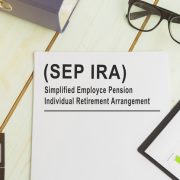Consider These Advantages to the Self-Directed SEP IRA
For the self-employed, building a retirement portfolio can sometimes feel like you are at a disadvantage. After all, every dollar towards retirement has to come out of your pocket, rather than simply contributing part of your paycheck toward a retirement fund with employer matching. But there’s also good news. People who use a Self-Directed SEP IRA in their business can realize all sorts of retirement benefits when they open one and begin investing. What are those benefits, exactly? Let us tackle them one by one.
Advantage #1: Low Costs
A Self-Directed SEP IRA, also known as a Simplified Employee Pension IRA plan, is exactly what the title suggests: simple. And when it comes to financial accounts, simple typically translates to “low cost.” That is the case here. SEP IRA plans can be low cost, which makes them great vehicles for the retirement investor who wants to maximize the amount of money they set aside. That is especially important for someone who is self-employed and wants to maximize the value of every dollar they invest.
What do we mean by low costs? Consider this: many retirement plans that you set up with your business can have high operating and start-up costs. These are sometimes beneficial if you need to set up an expensive retirement benefit package for your employees. But not everyone will need to run their business this way. If you are self-employed and you are the only employee at your company, a SEP IRA is a simple way to put money aside without incurring these large costs. The result? You can put more of your own income toward retirement, rather than putting it towards the operation of the plan itself.
Advantage #2: Tax-Deductible Contributions
Many of us know that building a retirement portfolio through tax-protected accounts typically means that we can make tax-deductible contributions. With a Self-Directed SEP IRA, you can make a tax-deductible contribution of up to 25% of each employee’s compensation. And if you are self-employed, you are considered an employee, which gives you plenty of options for putting money away. This is one reason people who own a small company but want to maximize the amount they put aside for retirement might gravitate toward a SEP IRA.
Take a Self-Directed Roth IRA, for example. These are fantastic accounts with many of their own benefits, including tax-free growth. However, the contribution limits of a Roth IRA tend to be much lower than that of a SEP IRA. For this reason, someone who has a lot of income to put away toward retirement will have a better chance of doing so with a SEP IRA.
Advantage #3: Freedom of Choice
We are not just talking generically about why SEP IRAs can be so advantageous. We are also talking about Self-Directed SEP IRAs, which means that there is an additional layer to consider here. When you invest with a Self-Directed account, you have all sorts of options. You have the choice to put money into real estate, precious metals, tax liens, private companies, and LLCs, and more.
If you created your own SEP IRA, it usually means you are a self-employed individual and an entrepreneur who values freedom. There is no reason you should sacrifice that freedom when you open up a new retirement account—at least not if you don’t want to. With a Self-Directed retirement account, you will take more responsibility and freedom into your own hands, which ends up putting you in the driver’s seat for your own retirement plans. You should still consult with accountants and financial advisors, of course, but ultimately, the investment decisions are yours.
Interested in learning more about Self-Directed IRAs? Contact American IRA, LLC at 866-7500-IRA (472) for a free consultation. Download our free guides or visit us online at www.AmericanIRA.com.










